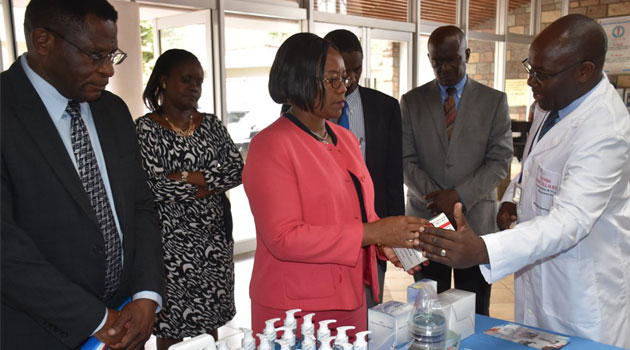
The newly appointed Cabinet Secretary for Health took a familiarisation tour of the facility on Friday/COURTESY
NAIROBI, Kenya, Feb 12 – County governments owe the Kenya Medical Supplies Authority (KEMSA) more than Sh2.6 billion in unpaid monies for medicines supplied.
According to acting Chief Executive Officer Fred Wanyonyi, the amounts were owed in unpaid bills from the last financial year.
“I know most of the Counties are newly installed in Office and need time to obtain funds after the supplementary budgets had been submitted to the Treasury and approved, I hope they would reduce the debt once the funds for those budgets are disbursed,” said Wanyonyi.
He said the agency currently has pharmaceutical supplies worth Sh13.5 billion in stock, saying the country’s chief supplies agency has enough drugs to keep public and private facilities supplied with drugs.
Wanyonyi made the statement during newly appointed Health CS Sicily Kariuki’s visit to the agency’s drug supply centre in Embakasi.
The CS who was on a familiarization tour of the agency’s facilities said she would engage with the county governments on the payment of the debt.
“I am going to speak to the governors about the need to pay the monies owed and also whether a percentage of total resources allocated require to be earmarked for health. This will enable the devolved units to more effectively implement the programs set aside for health through proper use of allocated funds,” said Kariuki.
Kariuki said the enterprise resource planning system placed at the facility would ensure that only the drugs required by KEMSA clients would be stocked, avoiding wastage and expiry of unused stock.
She said the agency had undergone a radical shift in its operations by automating its business processes and systems, saying its transformation would assist the government achieve the Big Four Agenda of universal health care.
“Commodities and supplies stocked here are demand driven and the ERP system represents what the counties have indicated as their requirements this year,” she said.
The health minister also flagged off drugs and pharmaceutical supplies worth Sh100 million headed for Meru, Kajiado and Makueni counties, with another Sh100 million batches later headed for Kitui.
Kariuki expressed confidence in the resolution of the controversy over payment of medical teaching staff at universities which was ignited afresh by the Kenya Medical Practitioners and Dentists’ Union which issued a strike threat last week.
She said she would use a diplomatic approach to the medics’ union strike threat over medical teaching staff’s unpaid dues as contained in the Collective Bargaining Agreement (CBA) signed with the government last year.
Despite being only nine days old in the Ministry, the CS said she had experience to handle staff remuneration matters, having participated in the negotiations on the public service CBA in 2017.
“I bring experience to the sector having negotiated the CBA we signed with civil servants in the public service a few months ago. My stand remains the same as it was during those negotiations and that it is important for both parties to sit and talk,” she said.
“Health is far too critical an issue to simple be resolved by making demands and striking when we make demands. There is no problem too big to be solved if we sit and talk. We owe it to Kenyans who sent us to school to serve them to talk some more and amicably resolve the issues under review,” the CS added.
She called on the medics and other health personnel to avoid making strike threats and issuing demands, saying it was the responsibility of parties in the dispute to talk and come to an amicable solution for the sake of Kenyans.
“Let’s talk as concerned parties as the country belongs to all of us. We owe it to the Kenyans who gave us the privilege of education to talk and amicably resolve pending issues so that we can deliver universal health care services which should be fully implemented by 2022,” she said.









































